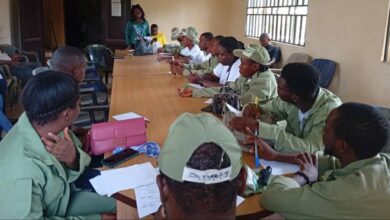Anambra Govt Set to Build Second Airport

Nigeria may finally be moving closer to uninterrupted electricity as the Federal Government has announced a major push for sustainability in the power sector.
Minister of Power, Adebayo Adelabu, made the promise in Abuja during the commissioning of two new blocks at the National Power Training Institute of Nigeria (NAPTIN).
The facilities include five modern training workshops and a 104-room hostel.
Adelabu described the development as a milestone that proves President Bola Ahmed Tinubu’s administration is “walking the talk and converting vision into action.
The minister revealed that Nigeria had recently recorded its highest-ever power generation and transmission output.
He assured citizens that these gains would translate into reliable, round-the-clock electricity.
“In no time, we are going to witness a country where there is 24/7 uninterrupted power supply. This is possible and we have certainly seen the signs,” Adelabu said.
He explained that the government was already lighting up universities, teaching hospitals, primary health centres, and public institutions across the country.
According to him, stable electricity remains the foundation for progress in education, health, aviation, and other key sectors.
Adelabu also stressed that Nigeria has the resources and talent to achieve self-sufficiency in power equipment manufacturing.
“We have what it takes to start manufacturing our own meters, cables, transformers, transmission transformers and batteries. We have the brain.
We have the people. We must be self-reliant and sustainable, and we are very close to achieving this,” he said.
He added that the new training centres and hostel will build a skilled workforce ready to address challenges in a rapidly evolving energy sector.
Director-General of NAPTIN, Ahmed Nagode, praised the project as a foundation for a brighter energy future.
He disclosed that the institute plans to implement the Next Generation Rescue Programme to train and empower young Nigerian leaders.
Nagode commended the European Union (EU) and the French Government for their partnership and funding through Agence Française de Développement (AFD).
EU Ambassador to Nigeria, Gautier Mignot, confirmed that the bloc committed €8 million to the project.
He added that the EU has supported NAPTIN in developing 95 training courses, including 65 technical and 30 non-technical ones.
Since 2008, the EU has invested over €200 million in Nigeria’s power sector.
Its latest renewable energy package, worth €100 million, aims to deliver 400 megawatts of clean energy by 2027. This initiative is expected to benefit more than five million Nigerians.
The announcement signals a new level of optimism for citizens who have endured decades of unstable electricity.
If achieved, 24/7 power supply will transform industries, improve healthcare delivery, boost education, and reduce reliance on costly generators.
The government insists that the progress already recorded shows that Nigeria is closer than ever to solving its electricity crisis.
Post Views: 77





